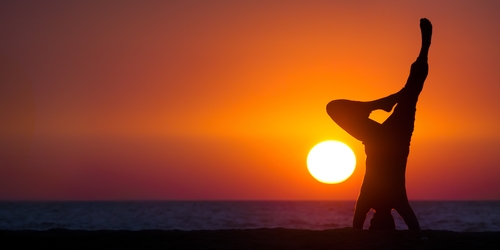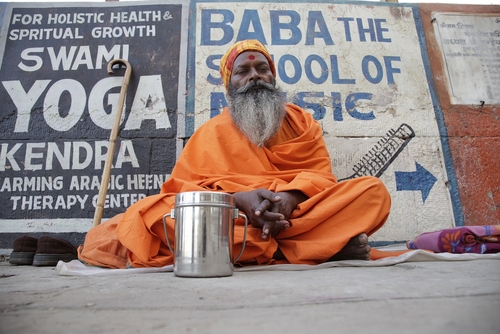Yoga woman image via Tom Wang / Shutterstock.com
Recently, a friend sent me links to a yoga debate, prompting one of those rare moments that can change the course of one's life. So I would recommend that you immediately click on the links below, even if you aren't a true yogi (the target audience for multinational companies stocking Whole Food shelves with all-natural fair trade organic deodorants).
The debate began with yoga expert* William Broad's revealing exposé in the New York Times magazine, "How Yoga Can Wreck Your Body." It has since exploded onto several media outlets, with experts arguing the merits of the yoga trend. One such debate was the Atlantic Wire "Cocktail Crossfire: Is Yoga A Crock?"
On the pro-yoga side was expert Rebecca Greenfield. She held positions such as: "When done right, yoga is a sweaty work-out. And, no, we're not just talking the 'hot kind.'" And, "Admittedly, yoga attracts some of the worst people on the planet: The image obsessed girls mentioned above, super-hippies, and self-righteous spiritual types. But any human that's obsessed with a type of exercise is generally intolerable."
I found these points both illuminating and disturbing. Before, I was under the assumption that I'd been doing yoga all my life. Yet things I believed to be the core of yoga -- yama niyama ideals, body awareness, breath control, etcetera -- have no place in it at all. When done right, as Greenfield points out, yoga is a series of sweaty contortionist work-out poses.
So all this time, I've been inadvertently lying, saying that I do yoga, when weeks can pass without me striking even one sweaty contortionist pose. And it pains me to admit it, but some of the most essential of these asanas, such as the head-stand (or, as yogis with street cred say, the sirsasana), I've rarely ever practiced in my life, having an irrational, utterly un-yogic desire for my head to remain above the rest of my body.
Sirsasana image via Anton Jankovoy / Shutterstock.com
The realization that I've been doing fake yoga all my life is worrisome enough, but it's been eclipsed by a much more troubling one. The position that experts on both sides seem determined to hold, is that I, along with some of my family and friends and hundreds of millions of desis worldwide (even those among us who regularly twist ourselves into the sweaty asanas of real yoga!), don't exist.
Perhaps we are too regrettably ethnic; too poor and male and old; perhaps it's that the majority of us can't distinguish Lululemon gear from wheatgrass facials and Jazzercise videos, much less afford these things.
Indian sadhu image via Dirk Ott / Shutterstock.com
Whatever the reason, it has led to an existential crisis. But the life-altering realizations don't end here, for there is also the con
position to take in.
"Yoga people," expert Elspeth Reeve points out, "are the types who think it's so great that a San Francisco yoga studeo donated it's [sic] used (yuck) yoga mats to Haiti to help homeless earthquake victims," and "in 20 years, all you yoga people will look back on yoga the same way you look back on Jamie Lee Curtis doing Jazzercise in control hose (embarrassed)." This is because yoga is "the greatest fraud ever perpetuated against American women for the sake of vanity."
What is almost more remarkable here than my nonexistence, is the incisive conclusion that Reeve reaches. The trendy New Age practice of yoga -- origins of which are lost in history, spread for thousands of years by Sanskrit texts, countless schools and traditions, popularized throughout India at the turn of the century by nationalists such as Aurobindo Ghosh -- all of this was for the sole purpose of fucking over modern American women like Reeve, attempting to destroy their health and, as if that weren't enough, also their fashion sense.
Now, one of the legacies of British colonialism (up there with railroads and partition) is that, due in part to the heroic, unsung efforts of educators such as J. H. Nelson and Charles Gover, I have a deep suspicion, oftentimes verging on unshakeable conviction, that there is no social or moral or economic problem that modern India faces, which cannot be laid squarely at the feet of the corrupt, power-hungry Brahmin caste. (And I say this with deep love for my tradition-bound, brutally oppressive Brahmin friends; they are hard-pressed to find evidence proving otherwise.)
Yet even with this, I was too naive to grasp just how diabolically clever and patient Brahmins are, that they could conceive of, and so flawlessly carry through, a plot such as this for thousands upon thousands of years. Luckily, though, I didn't have to, because experts such as Reeve were wise enough and brave enough to see and speak truth to such nefarious powers. And now the whole world can behold the misogynist plots of Brahmins such as Patanjali, more devious and secretive than gray aliens and Voldemort and the Illuminati combined.
* * *
More seriously: reading this debate, I'm reminded of critiques of cultural appropriation, such as Jane Iwamura's Asian religions without Asians:
Western practitioners appropriate what they want and need from Asian religious traditions. While [their Western] proponents might eschew any formal connections to an established faith [such as Hinduism ... ] they certainly enjoy the thin veneer of Asian-ness that coats the movement [...] Ultimately, the Oriental Monk or guru is seen as a remnant of a dying (or dead) civilization: the last of his kind. Those in the West [...] see themselves as the only ones who are able to appreciate the Monk’s ancient wisdom and as the tradition’s appointed heirs. Asians and Asians American certainly are not fit to play a prominent role.
There's a similar process that most practices appropriated and commercialized from POC communities go through, though the details and context vary according to the particular history (slavery; conquest and genocide; colonialization). As Russell Means, an Oglala Sioux activist, said about the spiritual commodification and misappropriation of Native American culture:
The process is ultimately intended to supplant Indians, even in areas of their own customs and spirituality. In the end, non-Indians will have complete power to define what is and is not Indian, even for Indians. When this happens, the last vestiges of real Indian society and Indian rights will disappear. Non-Indians will then "own" our heritage and ideas as thoroughly as they now claim to own our land and resources.
Paraphrasing writers/activists such as Means and Iwamura, yoga falls into the most common type of such cultural appropriation:
- Traditional practices are "discovered" by white Westerners, and imbued with a mysticism that likens the original practitioners to magical elves. And, just like those elves, the last "true" native practitioners are coded as having tragically departed/forsaken/repudiated the modern world (Middle Earth) for more distant, esoteric realms.
- Fortunately for the future of humanity, though, they have passed on their knowledge to a chosen few, who just happen to be predominantly white Westerners.
- These chosen few selflessly carry on their legacy, and make lots of money doing so.
- The commercialized and commodified versions of the appropriated practices bear
questionable resemblance to what they came from, or to what's still
present in their communities of origin. Yet the mutated versions come to define said practices, and the predominantly white Western practitioners come in effect to own it. - When challenged by communities of origin, the now Western authorities argue that no one can truly own such knowledge.
- The appropriated practices are marketed back to the communities that originated them.
- There's a swing in popular opinion. These practices go from a gift
that a spiritual, magical people have given modern Westerners to awaken
the shaman/Shiva/kung-fu ninja assassin monk that secretly lurks in
everyone's soul, to a reckless trend that only gullible hippies
attempt. (See also: sweat lodges, meditation)
While I'm not terribly impressed by the deductive powers of reason displayed by yoga experts who've just discovered that asanas can be harmful if improperly performed (next, they will prove the sky isn't always blue; at night it gets quite darkish), I remain amazed by the determination and narrow, single-minded focus necessary (*cue inspirational background track*) to keep appropriating and discarding practices from people of color, over and over, when just reading about it leaves me tired and exasperated.
----------------------
*"White American" and "expert" being probably redundant.










Comments
Varsha, hey, thanks for the comment.
I feel like we're trying to do different things here. You want to discuss the pros and cons of using asanas solely as a fitness regime. Yet as I stated in my article, the question of whether yoga's injury proof I find rather obvious, and therefore not worth much discussion. What would be interesting, imo, would be rigorous scientific studies and explorations on all the popular asanas, thoroughly examining their potential benefits and drawbacks. But (a) that is not what seems to be happening with this current debate, due to excessive reliance on anecdotal evidence and over-generalizations of limited and/or biased data sets on all sides, and (b) having neither a medical background or much knowledge of physiology, I wouldn't be able to contribute anything to such a discussion. So, if that's the discussion you're interested in, you'll have to engage in it with more qualified people! (And if there are readers who wish to chime in on this, feel free.)
My interest is the larger issue cultural appropriation, and how it plays out in the current discussion. So, to address the points of your comment which touch on that ("But I think that commodification of Yoga and taking it as a body-shaping fad is very much prevalent in India -the hoary fount of Yoga!... Given that a major proportion of folks doing Yoga see it as a fitness regimen (as opposed to a Spiritual discipline)...")
It wasn't my intention to essentialize Indians, to state that we all do yoga with no care for its material benefits. (I would be hard-pressed to ignore that Bikram Choudhury is trying to patent asanas...) There are, as you point out, many reasons Indians practice yoga, just as there are Westerners who're repulsed by how yoga's become a multi-billion dollar industry. Even creating an Indian/Westerner dichotomy, as I did in the previous sentence, is simplistic, especially considering how some desis are both.
That said, I disagree with your implication that there's no difference in yoga between the US and India, or that a major proportion of folks see it solely as a fitness regimen. To counter your generalizations with anecdotal evidence and my own generalizations ;): my senior citizen uncle is the biggest proponent of yoga in our extended family in India -- something that raises no eyebrows, because yoga isn't coded as being primarily for young rich female exercise buffs. There are free yoga classes in addition to expensive ones, ashrams that work on donations, an awareness of how much more there is to yoga even among some who solely practice asanas, those who do yoga for body-shaping and mental/spiritual benefits, etc. I could keep going, but once again, this is ignoring the underlying issue (see Sandip Roy's Om my god, who wrecked our yoga?, on the whitewashing of this debate, as well as the links discussing cultural appropriation in other contexts).
Though, Varsha, I will grant you that (due to globalization and the current racial and economic hierarchies, the underlying power imbalances) the way yoga's practiced in India increasingly resembles the way it's practiced in the US, especially among urban English-speaking middle & upper classes, and it might be that in the near future there's no difference at all, that it's nothing more than a body-shaping fad for everyone. I just don't think we're there yet. (So the disagreement is more on where exactly we are in this process, I feel, and not the process itself.)
Thanks again for your comment; I hope my reply clarified where I'm coming from?
Yoga is just the perfect storm of cultural appropriation in the image-obsessed, religiously-awkward, capitalistic dys/u/topia of the U.S.
I completely agree.
Also, three things rattling around in my head, prompted by your thoughts:
The first, re: Bikram Choudhury. I think he's internalized and mastered the Gordon Gecko greed is good mantra. He came along at the perfect time (when there was still need for mystic Eastern gurus to guide the chosen few), and was savvy enough to know how to most effectively market himself and his "brand" to the West, where the money and power was. And now, just like any other CEO and well-known yoga guru here, he's trying to corner the market and build a self-perpetuating monopoly, resulting in even more profits (he just seems to have gone a step further in seeking to patent the asanas themselves). That in the process, a tradition practiced by millions of people is turned into a high-priced commodity that they (and most of the world) are increasingly unable to afford, is so irrelevant that it's not even labeled an externality.
This is all to say, I have a hard time viewing him as a casualty!
The second: when talking about appropriation, I think that everything depends on context. Unsurprisingly, context is often ignored, and I say unsurprisingly because that is what appropriation is defined by. In other words, these days, practices such as yoga tend to be defined as universal when they're taken from less privileged communities and put under the control of the more advantaged ones.
Also, I don't think there's one true authentic form of yoga (or indeed, one true authentic form of anything), and so I try not to make distinctions such as sullied/unsullied. To back up a little. In my opinion, yoga can't be understood outside the context of the cultures/communities it came from, as well as those it's presently practiced in. And culture (and therefore the practices and traditions that define it) can't be understood unless it's acknowledged to be a process as much as the results of it, that this process hasn't ended and never will, and that the results will never be final. And in a world increasingly flattened by multiple-level hierarchies that suppress/trivialize/deny all that is labeled Other, it can't be looked at with anything even approaching clarity or objectivity unless we also consider the ways that these hierarchies shape it, as well as our understanding of it.
In other words, I feel like what is most important in these discussions is power, and all the ways it enters (and affects) the picture, and that is what's most often hand-waved away.
And to come back specifically to yoga: I don't think anything is set in stone, but if there isn't an awareness of the ways that racial and economic hierarchies affect its perception and practice (the current debate seems marked by a lack of such awareness), and if the underlying hierarchies remain unchanged, the process of assimilation will of course continue unchecked.
err, just where I'm coming from, and I'm still trying to figure out & clarify for myself some of these things. But hopefully this all makes some sort of sense outside my head!
Is all this critical analysis upsetting my Root Chakra???
OF COURSE. You shouldn't have even read the post, much less spent so much time thinking about it; these sorts of things only end up harshing your zen!